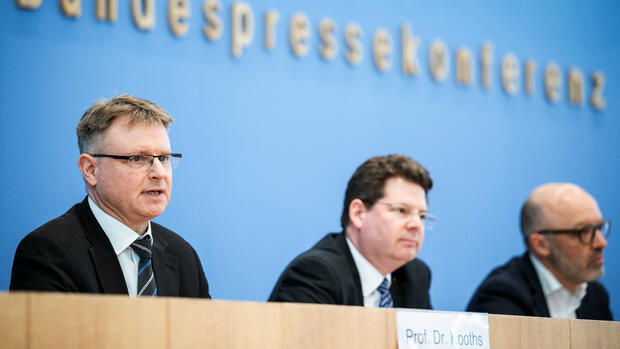The economists take a critical view of an industrial electricity price
(Photo: dpa)
Berlin The four leading economic research institutes in Germany warn against subsidizing electricity for industry with state aid. That was “highly counterproductive,” said the Vice President of the Halle Institute for Economic Research (IWH), Oliver Holtemöller, when presenting the joint economic forecast by the IWH, the Leibniz Institute RWI in Essen, the Ifo Institute in Munich and the IfW in Kiel on Wednesday.
According to the economists, subsidies that thwart price signals are the wrong way to go. “The federal government should focus more on the price in the energy transition,” said Ifo economic chief Timo Wollmershäuser.
The economists are reacting to the federal government’s business games for an industrial electricity price. Concerns about de-industrialization have been spreading through the country for a few months because of the high energy prices. It is feared that energy prices, which are higher by international comparison, would lead to companies moving away. The government wants to prevent this with state support.
Direct contracts between industrial companies and the manufacturers of cheap energy from renewable sources should help. However, it will likely take until the end of the decade before this becomes possible on a large scale.
Berlin is therefore discussing a short-term industrial electricity price that will be reduced by a price cap or subsidies, similar to the current crisis instrument of price brakes.
>> Read here: Industrial electricity price plan: Large electricity consumers should be permanently protected against price risks
Chancellor Olaf Scholz (SPD) had promised an industrial electricity price of four cents per kilowatt hour during the election campaign. Because of the sharp rise in prices, this is now considered unrealistic, but the government coalition is talking about a subsidized price of around ten cents.
A lack of price signals could lead to economic contraction
The institutes consider this a big mistake. They fear enormous macroeconomic damage because the lack of price signals makes the search for innovations less attractive. However, this is necessary in order to achieve the climate targets. The institutes refer to calculations as part of their most recent forecast, which they prepare for the Federal Ministry of Economics.
The institutes have calculated how Germany can reduce its CO2 emissions as required by law. For this, the German economy will have to save energy. This can be done in two ways: through technological advances such as new machines that use less energy. Or through direct savings by companies reducing their production. The second way would reduce economic output.
The energy prices in Germany, which are high in international comparison, are a burden on industry.
(Photo: dpa)
The result of the calculations: If Germany wants to achieve its climate goals without restricting economic growth, technological progress in the energy sector must accelerate significantly. In the 2000s, progress averaged just 1.8 percent annually. If that stays the case, Germany would have to save so much energy directly by 2030 for the climate targets that the economy would shrink by 14 percent.
- If you include the strong technological advances after the oil crises in the 1980s, the historic energy saving progress is 2.7 percent per year. But even that would not be enough in the next few years, the German economy would then have to shrink by three percent by 2030.
- However, in order for the German economy to continue to grow as predicted in the joint forecast, an increase in technological progress to 3.9 percent per year is necessary.
- Hope is based on the experiences of the past year. The Federal Ministry of Economics reports that technological progress in 2022 was almost seven percent. The reason: the enormous price increases have increased the pressure on companies to invest in energy-saving technology, the economists explain. “You could see that the price is quite effective,” says Holtemöller.
Unemployment benefits instead of corporate subsidies
The researchers do acknowledge that higher energy prices will have drastic consequences for some companies. There will certainly be migration and jobs will be lost as a result.
However, the workforce in Germany is scarce anyway. The people who lose their jobs would not stay without a job for long. In the meantime, the welfare state is available, says Holtemöller: “We have very good social security systems, and then they just have to work.”
However, the scientists make one restriction: there could be certain economic sectors in which subsidies could make sense in order to keep the company in Germany. Holtemöller named certain parts of the drug or energy supply. However, economists cannot assess which sectors this affects in detail, but rather physicians, engineers or other experts from the respective fields have to assess it.
>> Read here: Study: Habeck’s plan for energy efficiency could shrink the economy
The expansion of renewable energies could give companies some room to increase their energy-saving progress. Then there would be more CO2-free energy.
According to the institute’s calculations, expanding wind, water and solar power twice as fast could ensure that annual technological progress of 3.2 percent instead of 3.9 percent would be enough for Germany to achieve its climate target without a shrinking economy.
More: Economic experts expect 0.2 percent growth in 2023.
